

Millennial Grocery Shopping Habits and Marketing Trends. The Digital World of Millennials. Millennials—also commonly referred to as Generation Y and echo boomers—are the first generation to come of age in the new millennium.
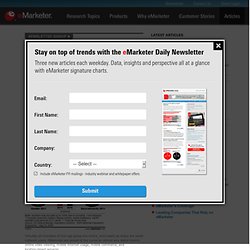
Unsurprisingly, the internet’s role is paramount among the age group’s media habits and usage. From shopping to socializing to watching TV, they do it all online. “Millennials represent a critical target for marketers, and the best place to reach them is where they are—online,” said Jared Jenks, eMarketer analyst and author of the new report, “Demographic Profile—Millennials.” Millennials comprise nearly a quarter of the total US population, and are evenly split between males and females. The Rise of Generation C. Colin is a 20-year-old computer science student living in London with two other students in the year 2020.
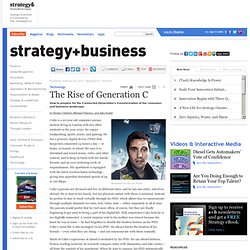
He enjoys backpacking, sports, music, and gaming. He has a primary digital device (PDD) that keeps him connected 24 hours a day — at home, in transit, at school. He uses it to download and record music, video, and other content, and to keep in touch with his family, friends, and an ever-widening circle of acquaintances. His apartment is equipped with the latest wireless home technology, giving him superfast download speeds of up to 100 Mbps.
Colin’s parents are divorced and live in different cities, and he has one sister, who lives abroad. We all want to be young - the death of the tribes? - inspiration strikes. Affluent Gen-Y Hooked on Social Media, Brands. Digital media is trouncing traditional channels among up-and-coming Millennials: 81% of affluent Gen-Y adults use Facebook every day—roughly double the number who read newspaper content (45%) or watch TV (44%) daily, according to a new study by L2.
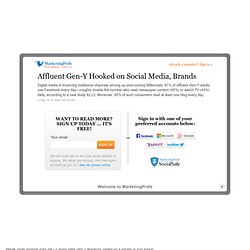
Moreover, 45% of such consumers read at least one blog every day. Gen-Y affluents are 27 years old on average, and they are on a path to earn over $100,000 annually in the short term, and double that income within the next five years, according to the study. Facebook is fundamental among Gen-Y affluents: Over one-half say their attitudes about brands are shaped by Facebook. 54% have "liked" a brand on Facebook in the previous month. 38% have posted a comment in the previous month. 30% have "shared" brands with their networks in the previous month. Below, other findings from the L2 study titled Gen Y Affluents, based on a survey of 535 young adults. Connecting With Brands via Social Media The Blog Generation. Special Report - Marketing to the Millennials. It encompasses the wired interiors of the London and New York headquarters, the embrace of videos, Skype-ing between design team and factory, as well as the more outwardly visible live-streaming and 3-D filming of recent shows and the “Art of the Trench,” the Web site set up specifically to promote the iconic Burberry trench coat with the photo blogger Scott Schuman, known as the Sartorialist.
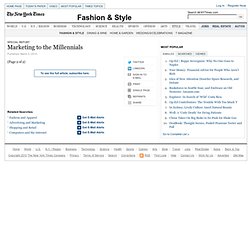
“Attracting the Millennial customer to luxury started two years ago — I said that we can either get crushed or ride the greatest wave of our life,” says Ms. Ahrendts. “We brought people on the team who were Millennials. I knew it was not my mother tongue — and I don’t have time to learn it.” One savvy move was to make Emma Watson, born in 1990 and who famously plays Hermione in the Harry Potter movie series, the new face of Burberry.
“She was 19. Although youth is always cited as the key to the Millennium generation, the digital state of mind encompasses a broader reach than might be expected. Mr. MillennialMarketing - home. Can Marketers Catch Up with Millennials? Millennials are the first generation to be raised with online media.
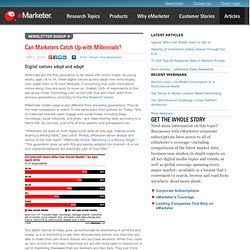
As young adults, ages 18 to 34, these digital natives quickly adopt new technologies, then adapt them to fit their lifestyles. Millennials spread online word of mouth - Warc News - Warc. Word-of-mouth still largely an offline phenomenon: study. It’s not often that brands are willing to share the mistakes that occurred during their social media campaigns, even though those are often the most valuable insights.
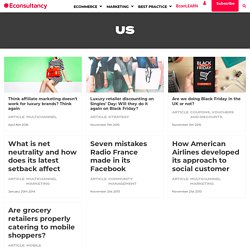
Therefore it was very refreshing to hear Radio France’s head of digital marketing Virginie Cleve talk through a few of the things that didn’t go to plan when the business embarked on a new social strategy. Cleve was speaking at Socialbakers’ Engage NYC event today where she revealed that the public broadcaster, which has more than 5m daily listeners and attracts 3.5m unique visitors per month to its website, redesigned its digital marketing strategy in 2011 with a new focus on editorial. Who Are the Millennials? We All Want to Be Young. What Young Adults Believe. A belief by young adults that "the world needs to be changed" is probably something that doesn't change from one era to another.
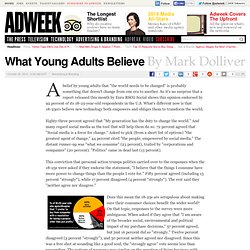
So it's no surprise that a report released this month by Euro RSCG Social shows this opinion endorsed by 92 percent of its 18-25-year-old respondents in the U.S. Millennials Show Off Brand Relationships. What does it mean for users to be willing to form relationships with a brand online and share them via the publicity of a “like” on Facebook, for example?
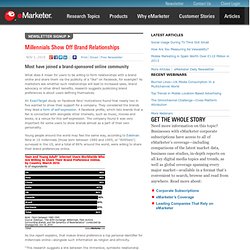
As marketers ask whether such relationships will lead to increased sales, brand advocacy or other direct benefits, research suggests publicizing brand preferences is about users defining themselves. An ExactTarget study on Facebook fans’ motivations found that nearly two in five wanted to show their support for a company. They considered the brands they liked a form of self-expression. A Facebook profile, which lists brands that a fan is connected with alongside other interests, such as music, movies and books, is a venue for this self-expression. How to Connect With Millennials. Two recent pieces provide some context and insights for how to best connect with the Millennial generation (broadly, spanning ages 11-31, born between 1978 and 2000) – who we know to be key to many brands’ long-term business relevance, as well as significant consumers of digital media.
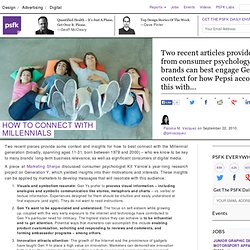
A piece at Marketing Sherpa discussed consumer psychologist Kit Yarrow’s year-long research project on Generation Y, which yielded insights into their motivations and interests. These insights can be applied by marketers to develop messages that will resonate with this audience: